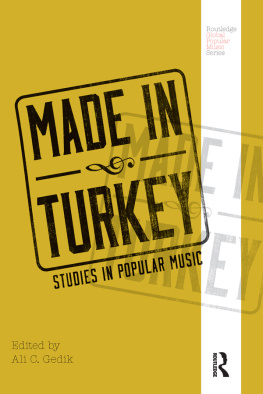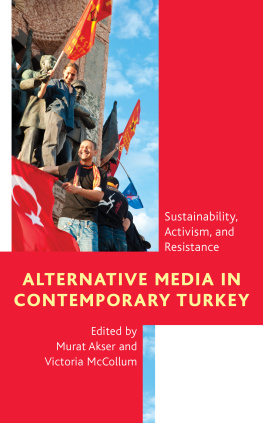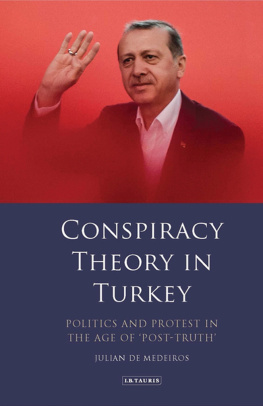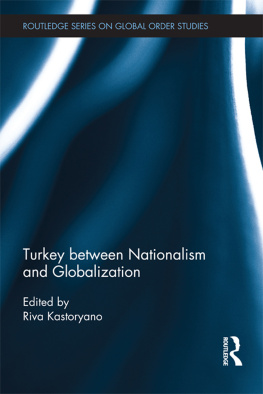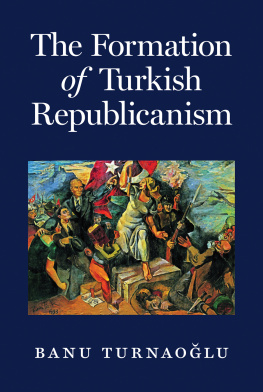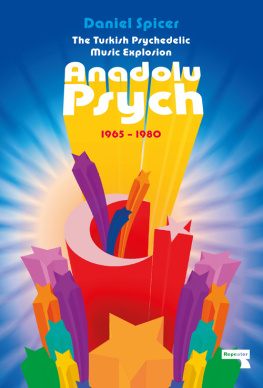ISBN 9783110650396
e-ISBN (PDF) 9783110654509
e-ISBN (EPUB) 9783110650754
Bibliographic information published by the Deutsche Nationalbibliothek
The Deutsche Nationalbibliothek lists this publication in the Deutsche Nationalbibliografie; detailed bibliographic data are available on the Internet at http://dnb.dnb.de.
2020 Walter de Gruyter GmbH, Berlin/Boston
Introduction
Berna Pekesen
As in other countries around the globe, Turkey in the long sixties experienced substantial social changes, mass mobilization, and multifaceted forms of popular protest. This period is no longer current affairs but has become the recent past. As such, it is increasingly attracting scholarly attention. Historians of Turkey in the 1960s have the challenging task to analyze transformations in every sense of the word with lasting effects on Turkish politics, society, and culture until today. During these years, the country began to undergo a sweeping change from a largely pre-capitalist peasant economy to a growing capitalist one. Due to rural exodus, increasing shares of the population lived in towns and cities. Main urban areas such as Istanbul, Ankara, and Izmir were ringed by shanty towns as the phenomenon of urban poor emerged. These aspects were accompanied by other indicators of change such as economic growth, political pluralization, growing individualism, rising levels of consumption, and the popularization of arts and politics.
Rapid changes were also tangible concerning government institutions. New political elite and middle-class configurations as well as struggles between social groups were all phenomena of the period. The newly emerging social and intellectual diversifications were widely reflected in the rise of social and extra-parliamentary political movements, mass mobilization, and popular protest. Western youth culture, liberalization of customs in daily life, and a relative economic prosperity coexisted with authoritarian politics, corruption, and political instability. Short-term democratization which was ironically provided by the constitution introduced after the military coup in 1960 was thwarted by the ups and downs of political repression after the military coup in 1971, which turned out to be a decisive blow against the polarized but vibrant civil society. These processes led to extreme frictions. Turkey in the 1960s, and particularly in the 1970s, was torn between violent activism and instable politics, exacerbated by the ideological fault lines of the Cold War. The dramatic rise of political violence exercised between right-wing and left-wing activists, and then again between the former and the security forces, had reached the scale of a civil war by the end of the 1970s, resulting in a death toll reaching well into several thousands of civilians. One of the long-term effects of these developments were the deepening rifts within society along ideology, party politics, ideologies and identities, which still do have effects on Turkish society today. Thus, there is an urgent need to analyze the subject-matter ever more closely and to shed better light on this crucial but largely unexplored chapter of recent history of Turkey.
).
Focusing on the 1960s does not mean, however, to encapsulate these years as a closed episode. Marking the beginning of an era is obviously easier than giving any specific date to its closure. This is even more so when it comes to study ongoing cultural, social, economic, and other longer-term phenomena, where the tendencies of development might be more difficult to detect, isolate, and identify as recurrent or consequent patterns. This is why Turkey in Turmoil does not set the years of the 1960s as a clear-cut demarcation line between previous and following calendar years but rather a point of departure from the histories told by the respective authors from their respective field of research. In some of the contributions previous periods, such as the historical and political heritage of Kemalism and Kemalist single-party-rule, are given special attention, while in others the focus is on outcomes and consequences in the following periods.
It goes without saying that writing on the contemporary history of Turkey poses exceeding difficulties and challenges for the scholar. The lack of historical research on the 1960s and even more on the 1970s made it difficult to stick to the given subject. Even though issues surrounding the recent past are at the very center of collective memories in todays Turkey, especially violent episodes such as the Mara massacres on Alevis/Kurds in 1978 and 1980, and the bloody left-right cleavages during the 1970s, a cohesive analysis of this period is still strikingly absent in scholarly works. Indeed, we know very little about Turkeys recent history. And what we know we owe to the work of sociologists, economists, political scientists, and journalists, who carried out their analysis as contemporaries of the time, but not (or seldom) as historians.
In the Turkish context it might not be an exaggeration to state that contemporary history has always been the concern of contemporaries, but to a much lesser degree of professional historians. This kind of labor division has its roots in the academic and scientific traditions in Turkey. The special field of interest on Turkeys history has been rather the distant past, the more distant the better. On the pretext of lacking or incompleteness of sound archival record, engaging in contemporary history has been downgraded, horribile dictu, to journalism. Thus, there is an equation of contemporary history with present-time history while historical studies in strict terms are still rather absent. A glance at the list of newly published books proves this discrepancy. The majority of studies on contemporary history has been undertaken in the field of politics and international affairs with a clear preference on the AKP (Adalet ve Kalknma Partisi/Justice and Development Party), Gezi Park protests in 2013, and Kurdish insurgence since the 1990s.
This is not to suggest, however, that sound scholarly works on the 1960s are non-existent. On the contrary, fundamental social changes since the 1950s and increasing political radicalization were a special field of interest of contemporary scholars of the time. Above all, political analysts and social scientists in Turkey and abroad have published an impressive body of literature on several aspects of this central chapter of Turkish history (see among others , 6667). In fact, there is still an acute need for shifting the focus from state and institutions to society.
The last two decades, however, saw a break with the grand narratives of nation and nation-state myths of Turkish history, which began to be replaced by innovative and challenging approaches to the recent past of Turkey. Since then a growing body of gender-studies, urban, social, and labor histories were able to create and adopt new analytical tools and generate new insights. Nevertheless, we can also observe that contemporary history of Turkey, as delineated above, is far from being an established sub-discipline, far from having a common discourse about historiographic problems and methods. Today, many scholars and intellectuals favor and emphasize cultural analysis with a clear focus on (primordial) identity, difference and diversity themes over structural or social/societal analysis, yet in many cases unfortunately with little concern for questions of methodology, theory, or concepts. This is why we currently know more about discourses and receptions of past events but less and too little about historical processes studied on the basis of sources. A methodologically open and pluralistic social history of Turkey in the twentieth century is still a staggering desideratum. Likewise, the left-wing movements and milieus that began to flourish during the 1960s have rarely been dealt with by social scientists, whereas their ideological adversaries, the political right of the same period, has been subject of some academic studies of merit. This leads to disproportions or even gaps in the field. Overall, in terms of the 1960s, many of the popular and even some academic studies face several obstacles and pitfalls. This includes, above all, the lack of evidence and methodological accuracy not to mention the predominant proclivity to narrow down history to a tool of bestowing praise or blame on persons and past events. Apart from some good exceptions, studies in the context of oral history, for example, are at times flawed by presumptions suggesting that what people say is the historical truth. Thus, the notion of contemporary history as being intrinsically contentious seems to be the point and particularly in Turkey the near past seems to be peculiarly contentious.


